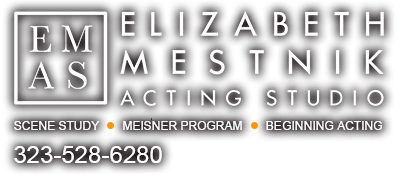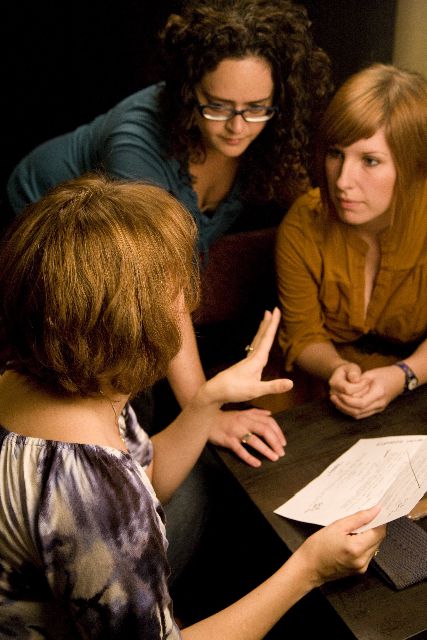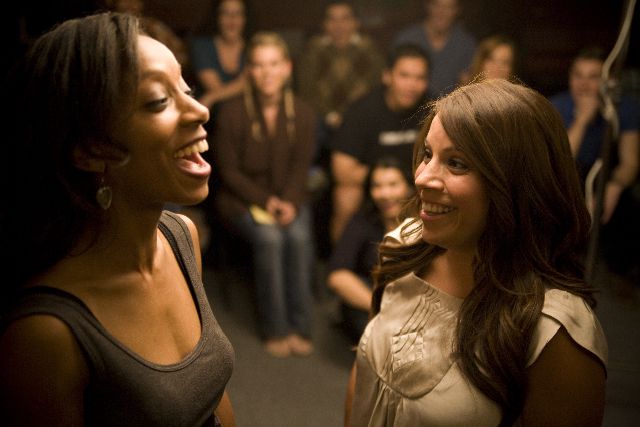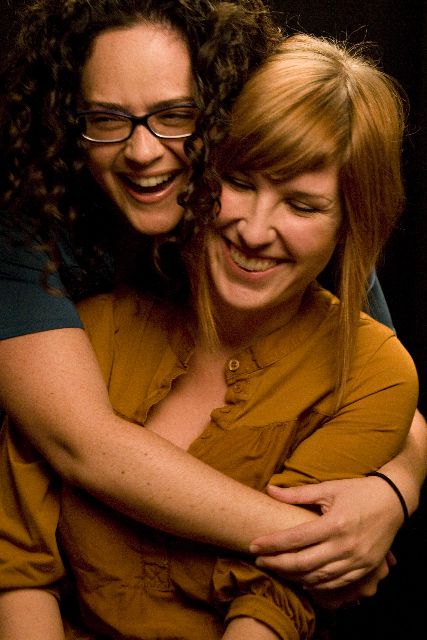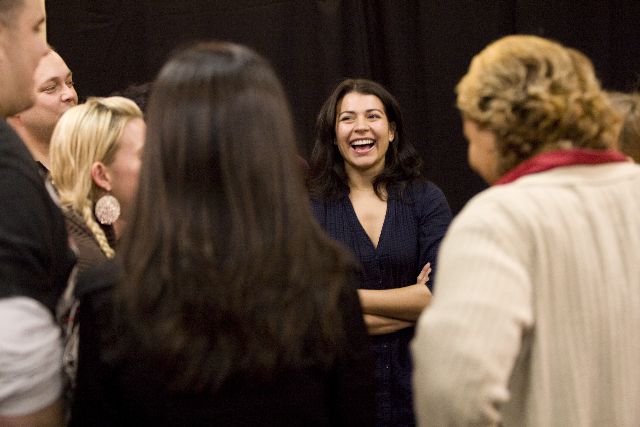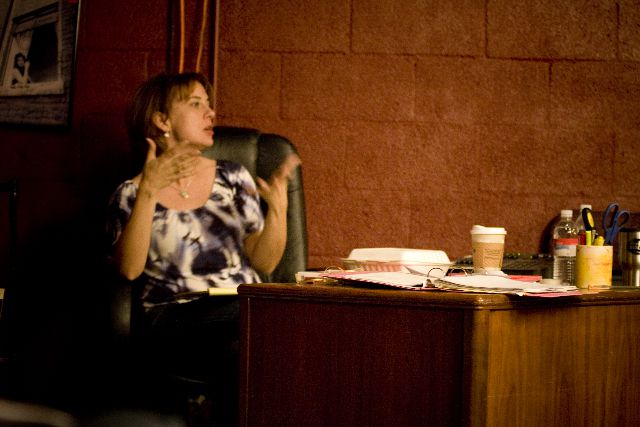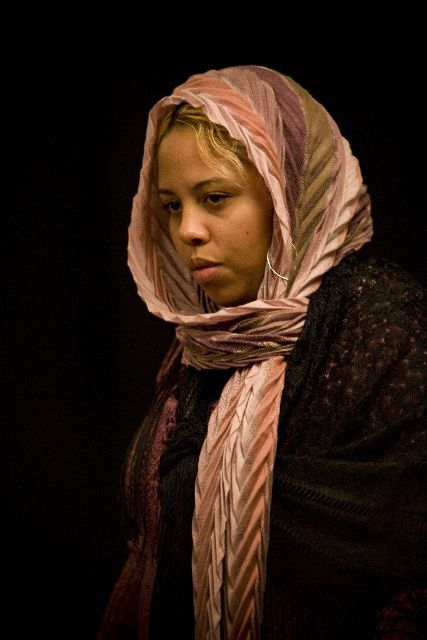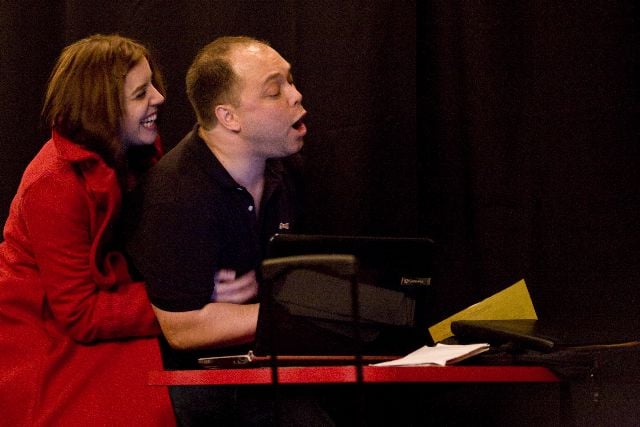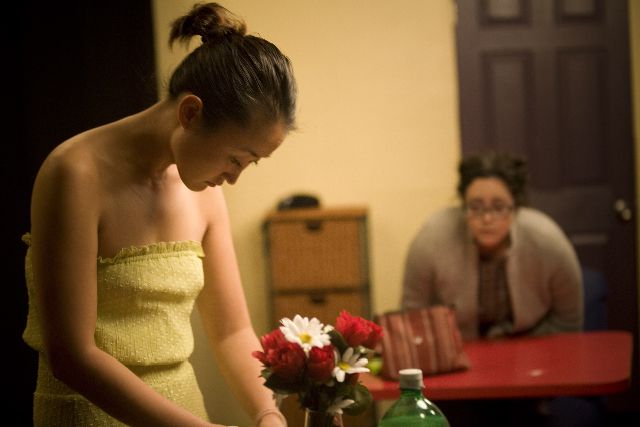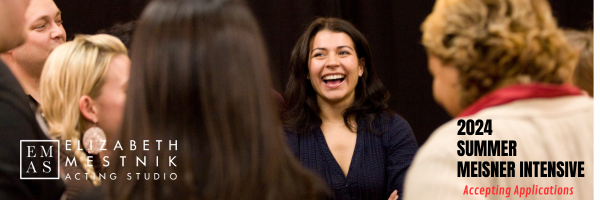Basics of the Meisner Technique
Great Acting Requires:
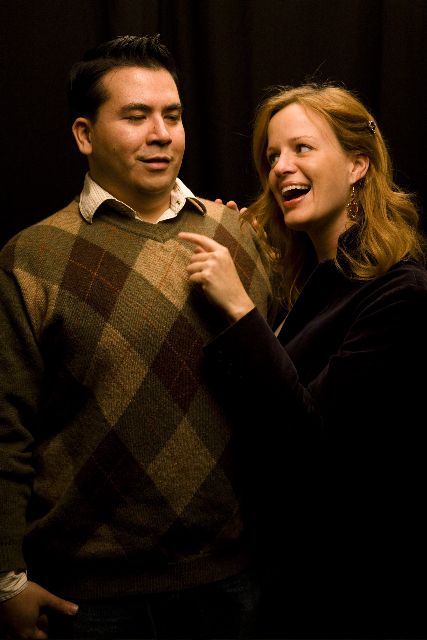 Connection: You must know how to listen and give yourself permission to be affected by your acting partners and the imaginary circumstances of the scene.
Connection: You must know how to listen and give yourself permission to be affected by your acting partners and the imaginary circumstances of the scene.
Focus: You must learn how to focus on something outside yourself and how to really do what you are doing… for real, no pretending.
Expression: You must constantly work on being free to express emotion: which means allowing your feelings to come out in behavior.
Self-Knowledge: Developing your Unique Point of View about the world: you must know how you feel about things, people, and the world around you and what defense mechanisms you use in the real world to keep these feelings at bay. These defense mechanisms must be stripped away before any truthful behavior can be revealed.
Impulsiveness: All good acting stems from an actors instincts, by honoring impulses and not intellectualizing the work. We need to learn to act from our gut not our heads.
And you must have trained body and voice that is strong and dextrous enough to do all of this.

Technique: (noun) A systematic procedure, formula or routine by which a complicated task is accomplished; the way in which the fundamentals, as of an artistic work, are handled.
All serious artists commit themselves to learning the technique of their craft, no one is asked to play a Bach concerto at their first piano lesson, but in many acting classes beginning students are given complex scenes on the first day – asked to perform them, given a few perfunctory notes, and this is considered acting training.
The Meisner Technique, however, takes the training of actors as seriously and as systematically as the training of dancers and musicians. As teachers of Sanford Meisner’s work, we consider a mastery of “technique” (the SYSTEMATIC procedure needed by actors to create great performances) absolutely necessary. The Meisner Technique is a systematic, step-by-step process that allows for actors to gain the skill sets required to create a character and live in the imaginary world of the play. The skills required to act go way beyond how to memorize lines and hit your marks.
Everything we do in the Meisner Technique takes us back to those 5 major skill sets – and so how do we gain skills? How does an NBA player improve his jump shot? Not in the game – but through drills, exercises and PRACTICE! – and that is how we improve our connection, our focus, our emotional expression our self-knowledge, and hone our instincts – PRACTICE!

“Future of Acting with Elizabeth Mestnik” web video promotion
Elizabeth Mestnik Acting Studio, a dynamic Los Angeles acting school, based in the heart of Los Angeles’ entertainment industry, announced today the “Future of Acting with Elizabeth Mestnik” promotion. Elizabeth Mestnik Acting Studio will award one lucky winner with a free admission to the Fall 2011 Acting Foundations Class (Value $530).
See our contest official page at and press release
Movie Ticket Giveaway – Win AMC Gift Cards
We’re excited to announce that we’re giving away two $25 AMC Gift Cards to the lucky winners of our March Giveaway (February 21st – April 1st, 2011)
All you have to do to enter is Connect with us on Facebook and/or Twitter and mention the Elizabeth Mestnik Acting Studio with a link to our site and why you think acting classes are important.
Fall 2010 Brag Sheet
The Elizbeth Mestnik Acting Studio (EMAS) isn’t just a Professional Acting Training Program. It is a community of actors, writers, producers and directors who are out there putting their stamp on the Entertainment Industry in Hollywood, New York and across the country. EMAS is proud of all the work current students and alumni are producing. Here’s a short list of what our members have booked, released, shot, performed, produced or developed in just the past 6 months.
Vanessa Alderete: Film: Confessions of a Gangster.
Glen Alexander: Founder Three Feathers Theatre Company
Sharif Atkins: TV: White Collar, The Good Wife, the Preacher’s Kid
Whitney Ayers: Theatre: Off Broadway: Sex, Relationships, and Sometimes Love, Renegade Theatre LA TAPE, Film: Egg Nog, A Brief History of Women.
Chris Bensinger: Broadway Producer: La Cage Aux Folles-TONY AWARD, American Idiot-TONY NOMINATION, Street Lights- New York Music Festival ’09
Jeannie Bolet: Film: Spiral, Strange Food, TV: All My Children, Webseries: After Hours. Signed with Val Maur Talent.
Nelson Domingo: Theatre: Actor’s Workout Studio’s The Comedy of Errors, Signed with JLA Talent, Founder of Three Feathers Theatre Company
Charles Davis: TV: The Game, Night and Day (tv movie), Signed with CESD.
Colin Day: Film: The Lonliest Road in America, Theatre: Elephant Theatre, Love Bites, Block Nine.
Allison Dykstra: TV: True Jackson
Silvana Gargione: LA Improv Fest and Boston Improv Fest. Theatre: Sylvia Plath is my Co Pilot.
Lily Holleman Film: UrFrendz, Kitty Kitty (short) (post-production), T.V. Southland, Tracey Ullman’s State of the Union ,Theatre: South Coast Repertory Circle Mirror Transformation (January 2010)
Jackie Kamm: Film: Nipples & Palm Trees.
Susane Lee: TV: True Jackson, TV movie: Kosher Pig
Cat Love: Founder Three Feathers Theater Company
Jordana Oberman Film: The Preening Swan (post-production), Mushroom Hunt (short). Theatre: Dear Harvey.
Ketryn Porter : Webisodes: The Alarmingly Charmingly Cousins, Klassy (in production) Pilot: Dudes in Toyland
Katie Ross: Film: Night Drive
Richard Robichaux: Film Lead: Bernie opposite Jack Black, TV: Better off Ted
Brad Schmidt: Broadway Debut: Lombardi
Lynn Trickey: Theatre: Actor’s Workout Theatre The Comedy of Errors, Signed with JLA Talent.
Billy Towers: Film: 3’s A Crowd , The Ghost Hunter.
Johnny Wactor: Film: Hold Up, Let Me Explain, Punctured, Golden Box, The Grass is Never Greener. Webseries: Hollywood Girl. Signed by Bobby Ball Agency
Ken Weiler: TV: Private Practice, Days of Our Lives, Film: Shrink
Christopher T. Wood: Film: Friends with Benefits , TV: Without a Trace
John Wilhovsky: Film: Young Again , Empress Vampire (post-production), The Gates of Heaven (short), 365 Days.
How to Win Over a Casting Director
Breaking into the film business isn’t the easiest thing to do in the world, but people continue to do it again and again.
So what’s the secret?
It comes down to three things: talent, experience, and luck.
This pretty much applies to just about every job in Hollywood, but especially for actors and actresses.
That’s why it’s hard – that’s not to say there aren’t talented individual people out there that find they’re most happy when they’re acting.
For the latter, there are a few things you can do to enhance your chance of winning over a casting director and their assistant during your next audition.
1. Let Your Talent Shine
One of the most important elements casting directors look for in actors and actresses is talent. They want to see that you have some sort of spark of talent that has the capacity to blow up and surprise us.
If you’re truly talented, and you’ll know because you’ll have tasted positive feedback, mild success, and other great things from your acting … even if you have yet to start pursuing it. As a child, did people suggest you become a movie star? Were people impressed with your personality or ability to act? If so, you’ve tasted the social proof that you entertain people.
Though this isn’t required, it’s often one of the signs that you really are talented.
2. Build Your Experience
Try to build your experience as much as possible. Talent scouts constantly lurk the crowds of shows and acting schools looking for that special someone they’d like to present to their client.
Do something so you can say you’ve done it. Perform in a show. Star in student films. Act as an extra. The key is to gain as much experience possible … and you should want to do this, not feel obligated.
Those scouts and agents are looking for you … help them find you. With just the right amount of luck, you’ll land representation and move on to bigger and better projects. The more you have on your resume, the more likely the casting director is to give you the opportunity to impress them with your performance.
Which brings us to the next point …
3. Make Your Own Luck
The more you do, the more likely you are to get lucky – that is, the more likely you are to bump into a producer, catch the eye of a scout, or land a roll with a project that actually goes to a festival.
Get out there and dig – success doesn’t come to people, people go to success.
This point doesn’t necessarily lead to impressing the casting director directly, but it might just lead to your casting director.
Overall, the idea is to walk into the casting office confident and ready to have fun. Build your experience, show your talent, and get a little lucky in the process and you might just impress the casting director enough to be called back for a second audition.
Article written by the Elizabeth Mestnik Acting Studio
LAX to the Elizabeth Mestnik Acting Studio Directions – by car
For those of you who are arriving from different cities, states or countries, we have included a easy directions map in google maps.
View Directions from LAX to the Elizabeth Mestnik Acting Studio in a larger map
Our physical location in Hollywood
The Elizabeth Mestnik Acting Studio would like to present our physical address for you to use Google maps and a direction map for your convinience.
Elizabeth Mestnik Acting Studio
6581 Santa Monica Boulevard
Hollywood, CA
(323) 528-6280
View Elizabeth Mestnik Acting Studio in a larger map
Also, see our kml
Social Media Updates

Hi everyone,
The Elizabeth Mestnik Acting Studio would like to present below a list of few social media and local accounts we would like to share with the public. Please see below and enjoy our blog.
- http://www.flickr.com/photos/emasla/
- http://foursquare.com/venue/534603
- http://www.brownbook.net/business/37773931/elizabeth-mestnik-acting-studio
- http://www.google.com/buzz/108200763408528176545/P9bhKxvXWeZ
- http://delicious.com/elizmestn
- http://www.stumbleupon.com/stumbler/emasla/
- http://www.propeller.com/member/emasla/
- http://www.mister-wong.com/user/emasla/
- http://www.hotfrog.com/Companies/Elizabeth-Mestnik-Acting-Studio
- http://www.flickr.com/photos/emasla/
- http://foursquare.com/venue/534603
- http://www.brownbook.net/business/37773931/elizabeth-mestnik-acting-studio
- http://www.google.com/buzz/108200763408528176545/P9bhKxvXWeZ
- http://delicious.com/elizmestn
- http://www.stumbleupon.com/stumbler/emasla/
- http://www.propeller.com/member/emasla/
- http://www.mister-wong.com/user/emasla/
- http://www.hotfrog.com/Companies/Elizabeth-Mestnik-Acting-Studio
Images from our los angeles acting classes
Read more about us and our acting classes at:
Elizabeth Mestnik Acting Studio
6581 Santa Monica Boulevard
Hollywood, CA 90038
(323) 528-6280
Upcoming Acting Class – September 20th, 2010
The Elizabeth Mestnik Acting Studio is welcoming in warm arms our new upcoming acting classes beginning from the 20th of September. We are all very excited and love new projects and acting adventures. See our website to find out what we are all about and be sure to read about the Meisner technique and our beginner and advanced classes.

We welcome you all to our acting class. Thanks.
Elizabeth Mestnik Acting Studio
6581 Santa Monica Boulevard
Hollywood, CA 90038
(323) 528-6280

